We are a participant in the Amazon Services LLC Associates Program, an affiliate advertising program designed to provide a means for sites to earn fees by linking to Amazon.com.
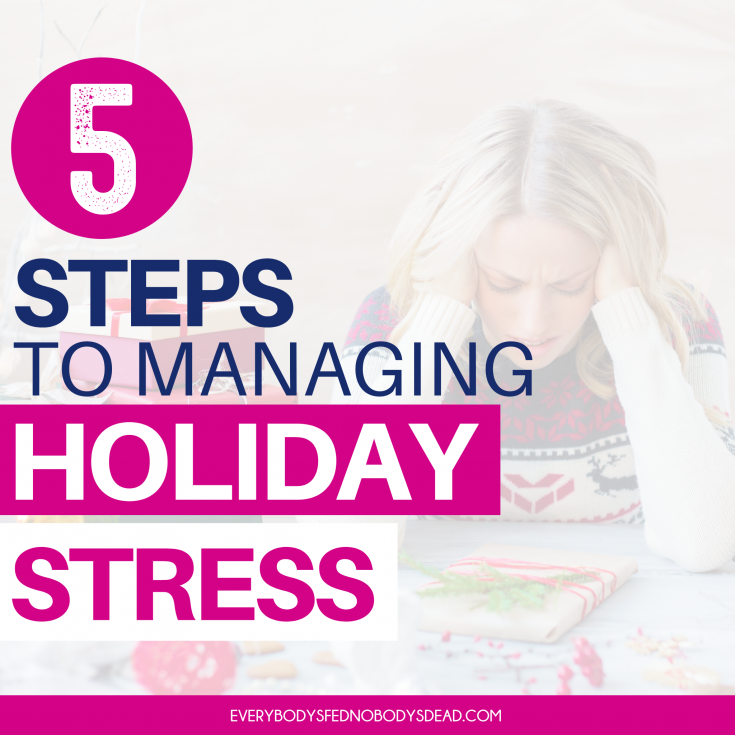
Stress has, sadly, become a normal part of our daily lives. Our fast-paced world celebrates increased productivity at the risk of our health and mental sanity, and Christmastime is a perfect example of that. I wish we didn’t even have to talk about this, but managing holiday stress needs to become a normal part of our Christmas planning.
Moms (more than anyone) feel pressure to create memories, preserve or start traditions, and give their families the perfect Christmas, all while forgoing their own mental health.
This year, managing holiday stress needs to be a priority. Your mental health is important. Don’t trudge through the holiday season on the verge of a breakdown.
Mama, let’s eliminate Christmas stress and holiday anxiety!
Here are 5 Steps to Managing Holiday Stress:
1. Figure Out Your Emotional Triggers
Triggers “…are situations or things, sometimes they can even be people’s behavior, which actually ‘re-trigger’ an emotional reaction to a past traumatic event. So, when you are triggered, you are really not responding to the present situation, but you are responding as if you were now in the past…” – Samina Raza, What Are Triggers and How to Deal With Them
Triggers are the things that set you off – the buttons pushed that cause you to lose it. These emotional responses most often stem from childhood memories or pain that was never correctly processed. This is why we most often feel emotionally reactive around family members; they know our triggers the best.
It shouldn’t be too hard to identify your own triggers, but if it is, think back to the things/conversations/events in the last year to which you reacted negatively. You can also ask yourself these questions from Psychology Today:
- A close friend or relative shares some exciting news about themselves. You’re happy for them but can’t help feeling envious.
What’s the news about? Is it a job promotion? A new car? Is she getting married? Does he have a new relationship? Are they expecting a child? - Have you noticed there’s someone you follow on social media to whom you constantly compare yourself?
What’s the thing that bothers you the most about their posts? How do you handle it?
- Have you noticed there is a topic of conversation that triggers you when hanging out with friends and/or family?
“Yes, when they talk about _________.”
– Mariana Plata, How to Spot Your Emotional Triggers
Examples of Triggers:
- Even though you begged and pleaded, your parents moved your family across the country when you were in grade school. You now crave control and hate surprises, and you react poorly when you feel overwhelmed, out of control, or helpless.
- Your ex yelled when he got angry. Now you’re scared to experience that again, and you go out of your way to avoid conflict that could result in raised voices.
- As a kid, your parents were strict and quick with punishment, even though you tried to please them. You rebelled and stopped following rules, and now you hate when people try to impose their rules on you.
- When the person you thought was your best friend spread rumors about you in school, you became a social pariah and felt humiliated. Now you surround yourself with people in an effort to feel less alone, and you seek validation of your self worth from others.
Depending on your personal trigger, it’s easy to react negatively when someone:
- Makes a comment about your parenting skills
- Pressures you to make a decision
- Tries to control you
- Rejects you
- Makes you feel unlovable
- Causes stress in your life
- Asks a personal question
When a situation like this arises, you can choose to deal with the situation and your emotions in a healthy way, or you can ignore the issue entirely, AKA: “Avoidance coping.”
“Avoidance coping” is exactly what it sounds like: avoiding a problem as a way of coping. But that’s not a healthy way to cope. Avoiding stressors, withdrawing from people, turning to an addiction, blaming others, and getting angry are only temporary distractions.
Until you deal with your triggers, they’ll always be there. You will always react the same way you always have unless you break the cycle. But once you recognize your triggers, you can choose to react differently, and eventually, you can spot potential triggers before they even happen.
This holiday season, you may already know your triggers. Maybe you already know your great aunt will ask when you’re having another kid, and you’re already feeling out of control and overwhelmed with all the gift-buying and memory-making that’s supposed to be fun.
If you already know your triggers, that’s progress! The next step is to plan how you will react.
If you don’t know your triggers or you can’t yet identify them, go into this holiday season with cautious observation. It’s easy to get swept up in the chaos, but try to pay attention to how you feel. Notice when something makes you feel sad, angry, uncomfortable, lost, confused, guilty, or ashamed. Those emotions are telling you what your triggers are.
Reacting to Triggers:
There are two parts to this: you can have responses and reactions ready for the triggers you know, but you should also have healthy coping skills ready to go for unexpected triggers.
What potential triggers could you face this year?
If you know there’s a good chance your mother-in-law will ask when you’re having another kid, rather than reacting in anger, you can come up with a clever response (like my personal favorite).

If past experiences have shown that cutting down a tree and decorating it on the same day results in tired, cranky kids, plan to decorate an artificial tree, or split the events into different days.
These are just simple examples, but having a plan in place for inevitable stressors will put you in the position to react positively when an obstacle pops up.
And since you can’t possibly know all the potential triggers of the holiday season, you need to pay attention and recognize when something causes you unease.
When you feel reactionary to something someone else has said or done, take a moment to consider your own past pain and the other person’s intentions.
Example: You’ve struggled with infertility for years and your distant cousin with four kids complains about how her baby never sleeps. You feel angry and want to tell her to be grateful. This is a great time to step away to a quiet place and think about why this triggered you. Even though you’re angry at your cousin, you’re really just frustrated at your own situation, and your cousin is probably going through her own struggles that are just as valid.
No matter what happens, emotions are inevitable, and that’s okay. If you get overwhelmed or someone says something hurtful and you don’t know how to respond, you’re allowed to excuse yourself and take a break.
Recognizing and validating your emotions allows you to deal with them in a healthy way. If you ignore your feelings and keep pushing everything down, you will eventually explode. It’s okay to have emotions! You just have to give yourself permission to feel them and move on.
If your triggers are interfering with your daily life, or are the result of unresolved trauma, please talk to a doctor or a therapist.
2. Take Care of Yourself
This might seem obvious, but moms have a bad habit of putting themselves on the back burner, and that’s especially true during the holidays.
Research shows that women are way more stressed out this time of year than anyone else, and as a result, women find themselves slipping into bad habits and forgoing regular self-care.
I’m all about “treat yo’ self,” but bubble baths and essential oils, while wonderful luxuries, can’t cure things like anxiety and depression.
So indulge in little treats on occasion, but to keep your mental health from faltering this season, it’s important to make sure you have a solid foundation:
- Don’t forget to eat, sleep, move, and drink water. Yes, these things seem obvious, but travel, stress, and late nights spent wrapping presents can easily eat into your basic needs. Make sure your body has the basic fuel it needs to tackle each day; you don’t want to crash on Christmas Eve.
- Be cautious with sugar and alcohol. I’m not saying you need to completely avoid these things, but it’s easy to use them as crutches. Definitely enjoy one or two of your grandma’s homemade cookies, but don’t eat an entire plateful because your sister-in-law is stressing you out. If you enjoy a holiday drink with family, be mindful not to overindulge, and avoid alcohol completely if you’re struggling with loneliness or depression. Alcohol consumption during the last 2 weeks of December is about 70% higher than any other time of year, and the majority of drug- and alcohol-related deaths take place in December (Common Holiday Triggers to Avoid Relapses).
- Practice intentional mindfulness. Don’t just fly through the holiday season in a mad dash to get everything done. Try to occasionally stop what you’re doing to engage with your family and make memories. You can also use your five senses for grounding if you feel overwhelmed or upset and need to refocus.
- HALT. Ask yourself: Are you hungry, angry, tired, or lonely? Make sure these basic needs are met before you attempt to help others or take on anything stressful. Mama, remember that you have to put on your oxygen mask before you can help anyone else put on theirs.

3. Manage Expectations
No amount of wishing or hours spent baking cookies can make our dreams of a perfect Christmas come true. But even though we know that Christmas won’t be perfect, we still try, maybe even subconsciously, to create incredible Christmas experiences, as if we all live in a Hallmark movie.
This has to stop.
“We expect to give and receive the perfect gifts from our loved ones, and we expect our families to be loving, supportive and compassionate during these encounters. If reality doesn’t meet our expectations, we experience disappointment, resentment, and stress – reducing our ability to be our best selves.” – Relly Nadler, Big Speak
Unmet expectations are a recipe for disaster and disappointment. So rather than hoping your husband will surprise you with the gift of your dreams or that you’ll have an incredible, meaningful conversation with every member of your extended family, think about what you really want and need.
Remember: quality > quantity.
Set your expectations low and create small, achievable goals for things you really want to experience during the holidays. And don’t get derailed by the pictures your mom friends post on social media – they’re just as stressed as you are.
Mama, you can’t do all the things. You just can’t. And you shouldn’t! Find ways to cut corners and spend more time relaxing and having fun.
When you lower your expectations, you make room to let go of so many unneeded stressors.
Here’s a list of things you DON’T have to do:
- Host a Christmas party (just meet up for dinner at a restaurant)
- Host guests (there are these cool things called “hotels”)
- Cook Christmas dinner (Chinese food for Christmas dinner is a blast)
- Make homemade desserts (grocery store cookies are delicious)
- Spend time finding the perfect Christmas gift for each person on your list (gift cards never go out of style)
- Travel to see family (you can totally spend Christmas with just your immediate family!)
- Mail out Christmas cards
Your mental health doesn’t just somehow “lose priority” because it’s Christmas. You don’t have to make anyone else happy, and you’re allowed to do things differently than you have before.
You’re also allowed to say “no”, and not feel guilty about it.
This Christmas, manage your expectations of others and don’t allow others to set high expectations that you can’t meet. Take care of yourself and do the best you can, then just forget the rest.
4. Prioritize and Simplify
So you’ve lowered your expectations and want to attempt a simpler Christmas, but how?
The first step is to sit down with your family and discuss what you all want Christmas to look like. It’s important to find out what everyone values and cares about so that you can all get on the same page and create a Christmas that works.
This means deciding together what to prioritize. Maybe the kids absolutely love sledding but are fine with skipping the yearly gingerbread house decorating. Or maybe your husband loves your homemade sugar cookies, but you hate the work involved, so you let your husband and kids make the cookies.
Once you have a list of what your family wants to do for the holidays, make some easy personal goals for yourself.
Examples: If the thought of spending the entire Christmas day with your great aunt stresses you out, give yourself a goal of staying at least until lunch. If your kids want to make three different Christmas crafts with you, tell them you can only do one. When you look at the calendar and see how full it is, aim to do just one family activity during the weekend, rather than two or three.
Part of simplifying and prioritizing is list-making and budgeting. After making a list of holiday activities, make a list of meals you’ll be cooking, gifts you need to buy, and any other list that will help you organize the information running through your head.
This is important not just for your own mental sanity, but it also allows you to have a physical list of what needs to be done so that you can delegate more effectively. Mom doesn’t have to be the only one baking, wrapping presents, or shopping!
And though it’s easy to go over-budget during the holidays, sticking to the budget will help keep your priorities in check.
Gifting doesn’t need to be the center focus of Christmas. Make a list of everyone that you’ll need to buy a gift for, set a specific dollar amount for each person, and then stick with that budget.
Tips for Simplifying Gifts:
- Not everyone needs gifts. You don’t need to get gifts for co-workers, distant relatives, friends, or even some family members. And you definitely shouldn’t get a gift for your boss.
- Gifts don’t need to be expensive. There’s no reason to spend hundreds of dollars on gifts. And if you want to buy something expensive, get it on sale on Black Friday or Prime Day.
- There’s nothing wrong with giving gift cards!
- Kids don’t need tons of gifts. Come up with a gift system, like the 4-gift rule, and don’t spend the holiday season trying to find the most popular toy that’s sold out everywhere.
Though it might sound like a lot of work to make lists and reduce spending, these actions will help to reduce decision fatigue.
Decision fatigue is the mental exhaustion you experience as a result of making too many choices. Every decision you make takes brainpower, and the more decisions you make, the more exhausted you become, and your brain begins to seek out shortcuts. There really is a limited amount of mental strength to get through the day, and it’s important to use that energy wisely to avoid making poor decisions at the end of the day.
Reducing decisions and saving mental energy can help you avoid reaching your breaking point when you aren’t ready. The exhaustion of decision fatigue can lead to poor choices, like snapping at loved ones or bingeing on unhealthy foods, especially during the holidays.
Prioritize and simplify the holidays any way you can. If you can’t, aim to reduce decision fatigue so you don’t deplete all of your mental energy.
For really great tips to reduce decision fatigue, check out What is Decision Fatigue? (And 9 Ways to Prevent It).
5. Have Fun!
When January rolls around, will you be exhausted from a stressful holiday, or will you look back at all the fun memories you made? You deserve a good holiday season just as much as your kids do, so what do you need to achieve that? What makes this time of year special for you?
Here are a few tips for enjoying the holiday season:
- Leave room on the calendar: You’ve prioritized and decided what you need/want to do this Christmastime. Now write it all on your calendar and step back to look at the entire month of December. Do you have some empty days in there? Do you have some events that can be missed if needed? Make sure you’re not only giving yourself days to rest but also time to spontaneously watch a Christmas movie or snuggle up by the fire with hot chocolate. Don’t let December fly by in a blur.
- Focus on the eternal rather than the material: Our materialistic culture shows its ugliest side during the holiday season, and the can’t-miss sales and holiday traffic wear our patience thin. Don’t allow yourself to get caught up in the worldly, temporary trappings of a commercial Christmas. Focus on family, giving, and the true meaning of Christmas, the gift of Jesus, our Savior.
- Have some go-to comforts ready for the tough moments. Make a list on your phone of things you can do to help you feel safe and relaxed when you’re struggling. Have a favorite song or two you can listen to as a distraction. Find a quiet spot anywhere you are that you can retreat to, if necessary – yes, hiding in the bathroom or sitting in an empty car totally count. Save your favorite Christmas movie for a day you feel lonely or depressed. Carry some chewing gum to use as a distraction if you struggle with anxiety. Keep your favorite mom journal in your purse for times you need a safe place to vent.
Managing holiday stress is a must.
Managing stress and holiday anxiety will help you finish the year on a high note. It’s never too late to prioritize your mental health. Stop what you’re doing right now and ask yourself “How stressed do I feel?” It’s not fun to admit we need help and we don’t have it all together, but motherhood is hard enough when it’s NOT a holiday.
Step back from the holiday chaos and take care of yourself. Teach your kids that stress doesn’t have to be a normal part of life and Christmas doesn’t have to look like a Hallmark movie.
How are you handling the Christmas stress this year? What part of the holiday season do you find to be the most overwhelming?
Posts You Might Like:
- Christmas Gifts Under $50 for the Cool Mom
- How To Choose Your Word Of The Year
- 21 Fun and Simple Family Christmas Traditions
- Stocking Stuffers Under $15 That Mom Will Love
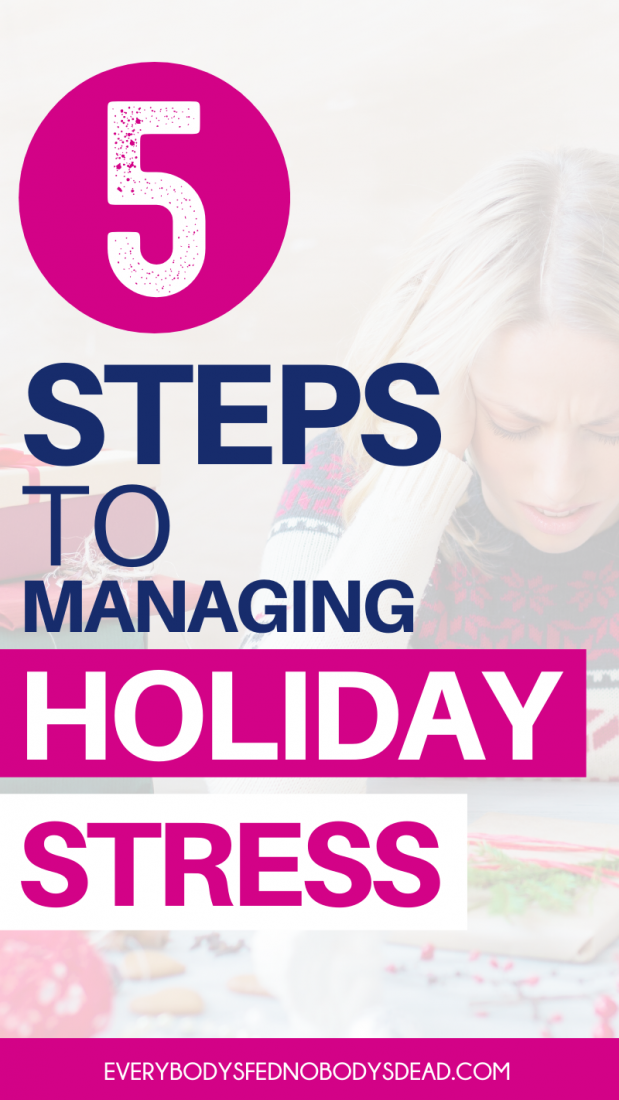
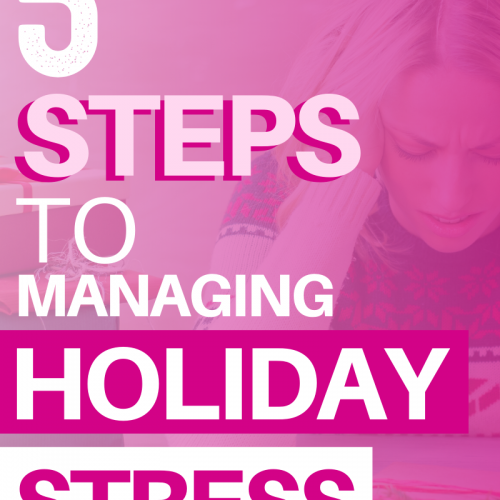
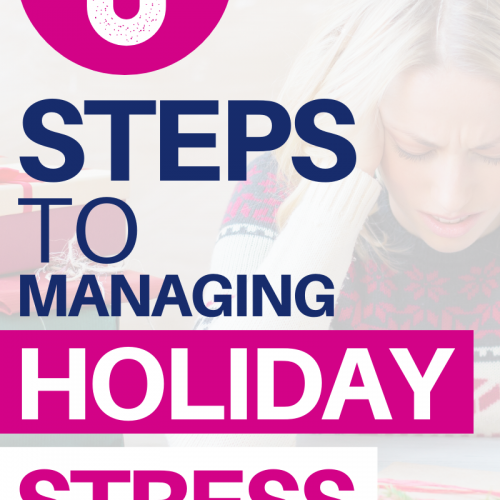




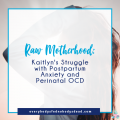
Leave a Reply
You must be logged in to post a comment.